During PM Hasina’s visit to the EU Global Gateway Forum on 25th and 26th October, Bangladesh has secured investment in renewable energy as part of the Global Gateway, thought of as the EU’s alternative to China for funding development efforts of the LDCs and developing countries.
As Bangladesh and the European Union celebrate 50 years of diplomatic relations which were built on strong democratic principles and respect for the rule of law, PM Hasina has joined the first-ever Global Gateway Forum in Brussels on EU President Ursula Von Der Leyen’s invitation. This is the first edition of the forum where 20 nations have been invited to join. The Global Gateway Forum is seen as a counter to China’s Belt and Road Initiative(BRI) as analysts have termed the initiative as the “European version of BRI”.
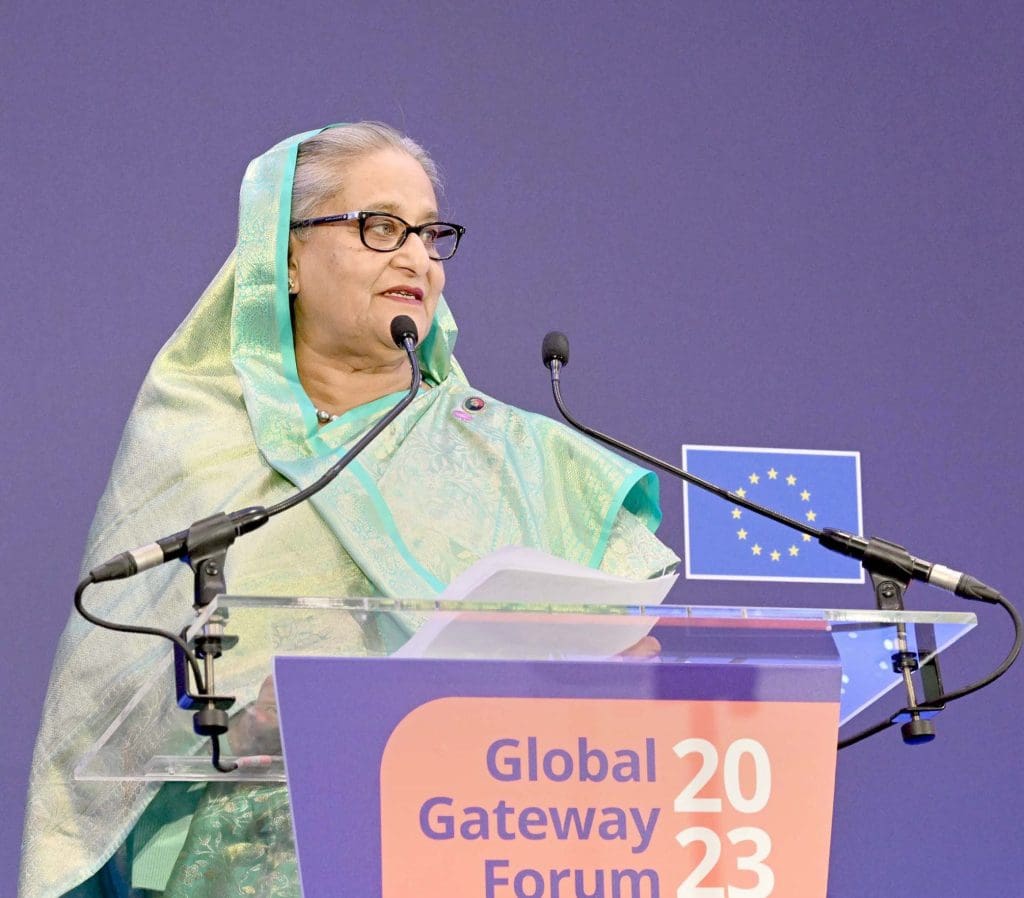
Prime Minister Sheikh Hasina in her speech has reiterated Bangabandhu Sheikh Mujibur Rahman’s founding principles on Bangladesh’s Foreign policy, “Friendship to all, malice to none”. The premier in her speech has signaled that the relationship between Bangladesh and global superpowers are based on mutual respect, economic cooperation and shared prosperity and peace.
The Premier had one important message during her visit to Brussels that her administration will not be taking sides when it comes to the battle for influence between China and Europe.
She said in an interview with Politico –
“Our foreign policy is very clear — friendship to all; investment for our own development. I have 170 million people in a small land, so we need investment — from every country. Everybody, according to their choice, can invest; we assess whether it is suitable for our country,”

Prime Minister Sheikh Hasina
In an interview with Politico
PM in her interviews in Brussels with foreign media made it clear that Bangladesh doesn’t take investment from any nation at face-value, rather her administration does proper due diligence to assess whether the proposed investments would benefit the people of her country and whether it would put pressure on the economy or not. Bangladesh has made serious economic progress in the last decade riding on textile and remittances but is facing economic headwinds due to covid 19 pandemic and increased fuel prices due to the Russia-Ukraine war.
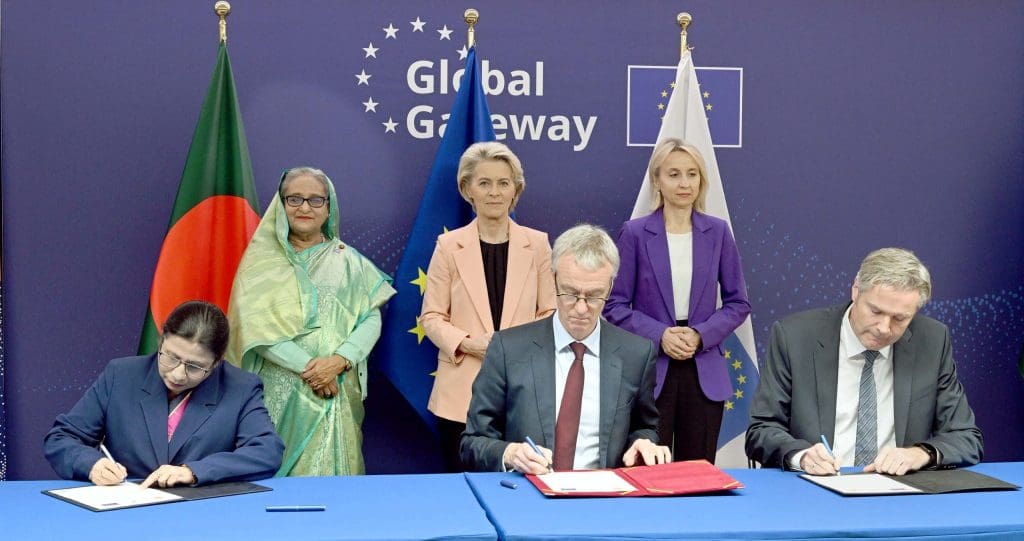
She urged the global leaders to do everything in their power to stop wars and avoid unnecessary arms races and invest the money in education and women empowerment. Her visit to Brussels for the Global Gateway Forum indicates that Bangladesh is looking to balance her funding share for infrastructural development, as the country is looking for alternative financing channels rather than depending on China entirely. Bangladesh is also a member of the Belt and Road initiative, a Chinese led global infrastructure development strategy.
Global Gateway Fund at a Glance
€
0
Bn
Size of Global Gateway Fund
Energy Transition to Renewables
Climate Change
Healthcare
Trade and Infrastructure
The Global Gateway Initiative is a worldwide strategy by the European Union to invest in infrastructure projects and establish economic partnerships, based on certain principles. The investment will range in areas like Energy transition from fossil fuels to renewables, climate change, healthcare, trade and infrastructure development. The size of the Global gateway fund is approximately 330 billion euro. For the LDCs and developing nations this opens up new funding opportunities in already squeezed funding channels due to economic slowdown in the advanced economies and war.
The European Union has been a long standing partner of Bangladesh since the latter’s struggle to independence. The relationship has steadily increased over the last 50 years. It is also one of Bangladesh’s largest export destinations. On the very first edition of Global Gateway Forum the EU has signed two investment packages with Bangladesh.
Two investment packages signed in the global gateway forum
€
0
M
For Green Transition
€ 350 M
For renewable energy projects, guaranteed by the EU
€ 45 M
Technical assistance and investment grant
€
0
M
Accompanying Project
€ 7M co-financed by Germany
For work on policy, legal framework and investment climate to facilitate an inclusive green energy transition
The first one is a Renewable Energy Package – more than EUR 400 million to boost the green transition in Bangladesh. The agreement between Bangladesh and EIB (€395 million) for renewable energy projects include an EU-guaranteed EIB loan of €350 million, complemented by a blending support package of €45 million that includes technical assistance and an investment grant. This is the biggest investment package received by Bangladesh from EIB in a single go as the European Union is desperate to counter Chinese influence in developing nations.
In addition, an accompanying Green Energy Transition project worth €12 million which includes €7 million that is co-financed by Germany aims to work on policy, legal framework and investment climate to facilitate an inclusive green energy transition. This project is part of Bangladesh’s initiative to reduce its reliance on fossil fuels and combat climate change.
Mujib Climate Prosperity Plan
Aimed to be achieved within 2030
0
MW Total Generation
0
MW Renewable
Current Share of Renewable Energy
Web Designer
4.6%
Share of Renewable Energy in 2030
Renewable Energy
17.4%
This financing will provide much needed support to realize the “Mujib Climate Prosperity Plan”, which aims to make the country capable of generating at least 6,000 megawatts (MW) of electricity from renewable sources, including solar power plants and wind farms, by 2030. As per the Mujib Climate Prosperity Plan, overall projected electricity generation will reach 28,975 MW in 2030, with renewable energy’s share increasing to 17.4 percent. Currently, it is only 4.6 percent. This will result in a 27.8 percent reduction in the use of fossil fuels and an 80.1 percent increase in renewable energy use within seven years, read a recently concluded study by Centre for Policy Dialogue.
In support of the education sector
€ 30 Million
To promote Decent Work
€ 10 Million
To scale up green transition
€ 10 Million
To boost effective digital governance
€ 10 Million
To prevent gender-based violence
€ 10 Million
Five additional cooperation actions, worth additional €70 million package in cooperation actions were signed between the EU and Bangladesh in support of the education sector (€30 million), to promote the decent work agenda, to scale up green construction, to boost effective digital governance, and to prevent gender-based violence in public spaces in the country (€10 million in each case).
Prime Minister of Bangladesh, Sheikh Hasina, said –
“We are confident that this initiative will enable developing countries such as Bangladesh to fight climate change, to address infrastructure gaps, invest in renewable energy, digital innovation, healthcare, education and much more. The Global Gateway is a sign of friendship, of partnership, of trust, of symbiotic interdependence”.

Prime Minister Sheikh Hasina
In an interview with Politico
European Investment Bank in Bangladesh at a Glance
European Investment Bank (EIB), the largest multilateral public bank in the world, started its operations in Bangladesh in 2000. Since then EIB has supported seven projects in the country and has invested close to 753 million euro in water, transport and health projects.
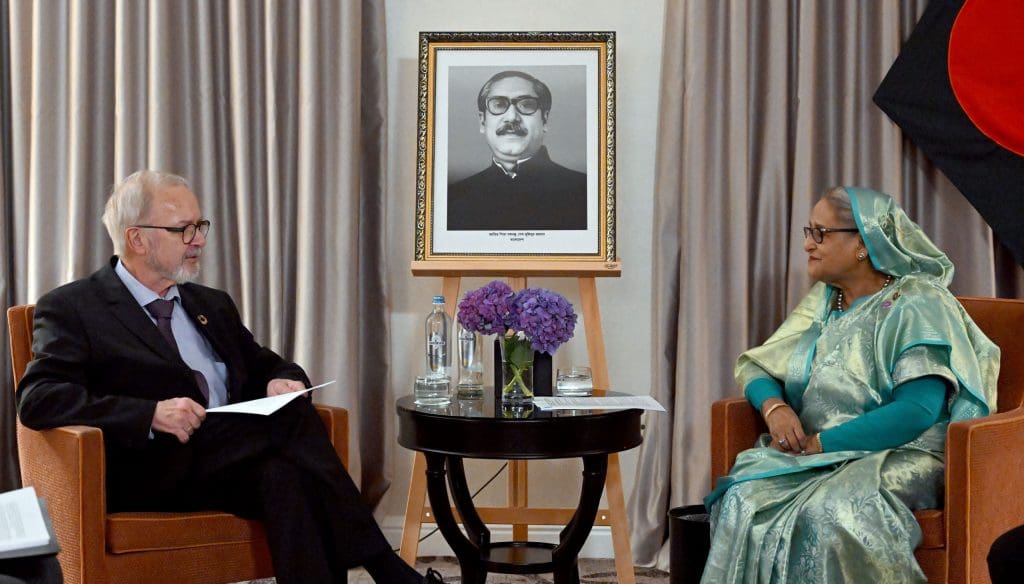
During the Covid 19 pandemic, the EIB provided 250 million euros to Bangladesh to support procurement of safe and effective vaccines and country-wide immunization against covid 19.
PM Hasina’s Call to the EU Leaders
Prime Minister Sheikh Hasina called upon the European Union (EU) to extend its business facilities (GSP+) for six more years for Bangladesh like developing countries to smoothen its journey towards prosperity after LDC graduation.
The premier has requested the European Union to extend its business facilities for six years instead of three years as Bangladesh like least developed countries (LDCs) have now been under pressure economically due to the Covid-19 pandemic and war, Foreign Minister Dr AK Abdul Momen told a press briefing quoting the Prime Minister.
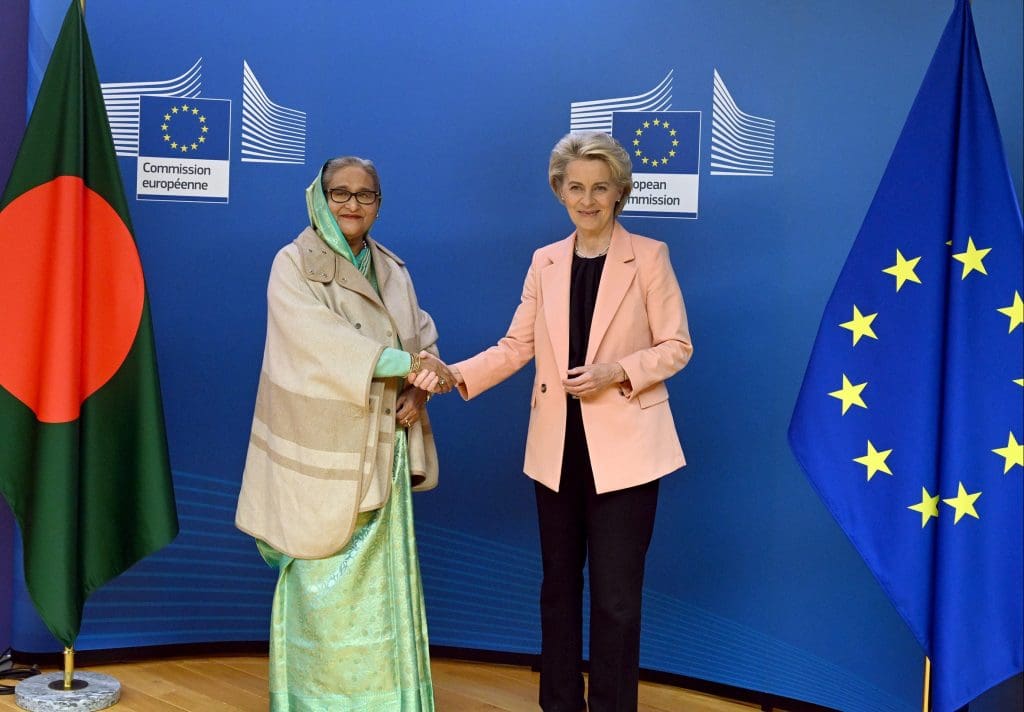
The Prime Minister, who arrived in Brussels, Belgium on October 24 evening, attended a total of nine events including the opening plenary session of the Global Gateway Forum and other side events including bilateral talks.
Several bilateral talks were held with EC President Ursula von der Leyen, Trade Commissioner and Executive Vice President of EC Valdis Dombrovskis, Commissioner for Crisis Management of the EC Janez Lenarcic, Vice-President of the European Parliament Nicola Beer, European Investment Bank President Dr Werner Hoyer and Commissioner for International Partnerships of the EC Jutta Urpilainen.
“The message is Bangladesh wants to maintain good relations with all and infrastructure development is its top priority. Nothing else,”
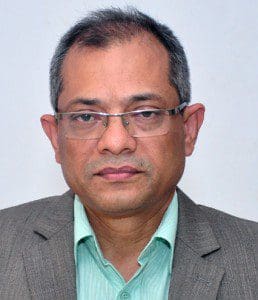
Professor Dr. Delwar Hossain
Department of International Relations, University of Dhaka
The visit by PM Sheikh Hasina is significant in the sense that it will dispel the perception that Bangladesh is tilted towards China. “The message is Bangladesh wants to maintain good relations with all and infrastructure development is its top priority. Nothing else,” Professor of International Relations Dr Delwar Hossain of Dhaka University told Dhaka Tribune.
The EU understands that developing nations like Bangladesh have huge demand for funds for their infrastructural development and without providing them means to address the need it will be impossible to sway these nations from Chinese influence. Bangladesh’s invitation to the forum entails that the notion that Bangladesh has gone under Chinese belt is an overstatement and the nation is simply looking for funds to achieve its target of becoming a developed country by 2041. Bangladesh has maintained a consistent GDP growth over 6% for more than a decade and in the last 15 years alone the size of the economy has tripled to around 450 billion USD. And the EU is ready to provide financing by soft concessional loans and grants. The Global Gateway strategy embodies a Team Europe approach that brings together the European Union, EU Member States, and European development finance institutions with an aim to mobilize €300 billion in public and private investments from 2021 to 2027, creating essential links rather than dependencies, and closing the global investment gap. With a population of 160 million+ Bangladesh is forecasted to become the ninth largest consumer market in the world by 2030, and a trillion dollar economy by 2040, a study conducted by US Boston Consulting Group and HSBC Global Research.
About the Author

Tanmoy Dhar is an Economics graduate from the University of Dhaka. He has served an associate at CounterFoto- A Center for Visual Arts.
1 comment
[…] rights in Bangladesh ahead of the 12th parliamentary election held on January 7, 2024 when the EU didn’t follow the United States’ footsteps tooth and nail. The Biden administration had imposed visa restrictions on people it deemed to […]